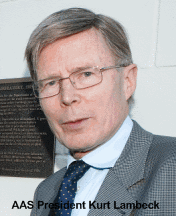|
|
|
|
|
|
|
News & Views item - April 2009 |
![]() The
Nobel Laureate and the Australian Academy of Science President Speak Out For
Fundamental Research. (April 2, 2009)
The
Nobel Laureate and the Australian Academy of Science President Speak Out For
Fundamental Research. (April 2, 2009)
 Whether
or not the story will go beyond The Australian's Higher Education
Supplement remains to be seen -- but it should. Australia's 2005 Nobel Laureate
in Medicine or Physiology, Barry Marshall and Kurt Lambeck, president of the
Australian Academy of Science, have come out strongly in favour of the Federal
Government substantially increasing its support for fundamental research.
Whether
or not the story will go beyond The Australian's Higher Education
Supplement remains to be seen -- but it should. Australia's 2005 Nobel Laureate
in Medicine or Physiology, Barry Marshall and Kurt Lambeck, president of the
Australian Academy of Science, have come out strongly in favour of the Federal
Government substantially increasing its support for fundamental research.
Professor Marshall told Andrew Trounson: "We have to fund enough [curiosity driven research] so that there is some spare capacity in the system, so that people can take advantage of the opportunities or ideas that come up, and not delay them so that someone else can discover them."
And Mr Trounson reports that in Barry Marshall's opinion peer review funding
bodies such as the National Health and Medical Research Council were too
conservative. Low success rates for grant applications of just 20-30 per cent
locked researchers into "masochistic" cycles where too much time and effort was
wasted on writing up applications and funding bodies paid too much attention to
detailed methodologies rather than focusing on the ideas. Amid fears that a
government funding boost for research will be delayed by the economic crisis, he complained that political support for science was patchy and too often a low
priority was attached to science.
complained that political support for science was patchy and too often a low
priority was attached to science.
Professor Marshall said a lack of funds for postdoctoral researchers was also a
problem as researchers were being diverted into teaching in order to make ends
meet.
"I think smart PhDs need to see a career structure that pays them as least your
average doctor's wages."
NHMRC chief executive Warwick Anderson was quick to deny Professor Marshall's assertions saying: "I don't think the system is actually as conservative as some people who don't get grants think it is", but Barry Marshall can hardly be considered a run of the mill disgruntled "denyerie" displaying sour grapes.
Professor Lambeck was rather more diplomatic in his language than Professor Marshall but nonetheless emphatic saying that while it was understandable that funding bodies were conservative, given limited funds, nevertheless the result was that potentially groundbreaking research was being stifled. "There is no slack in the system any more for people to do that bit of blue-sky research." And he went on to say that the support program for mid-career researchers the Government is offering (1000 future fellowships over five years each worth up to $140,000 a year) was too small to create critical mass for the nation's research requirements.